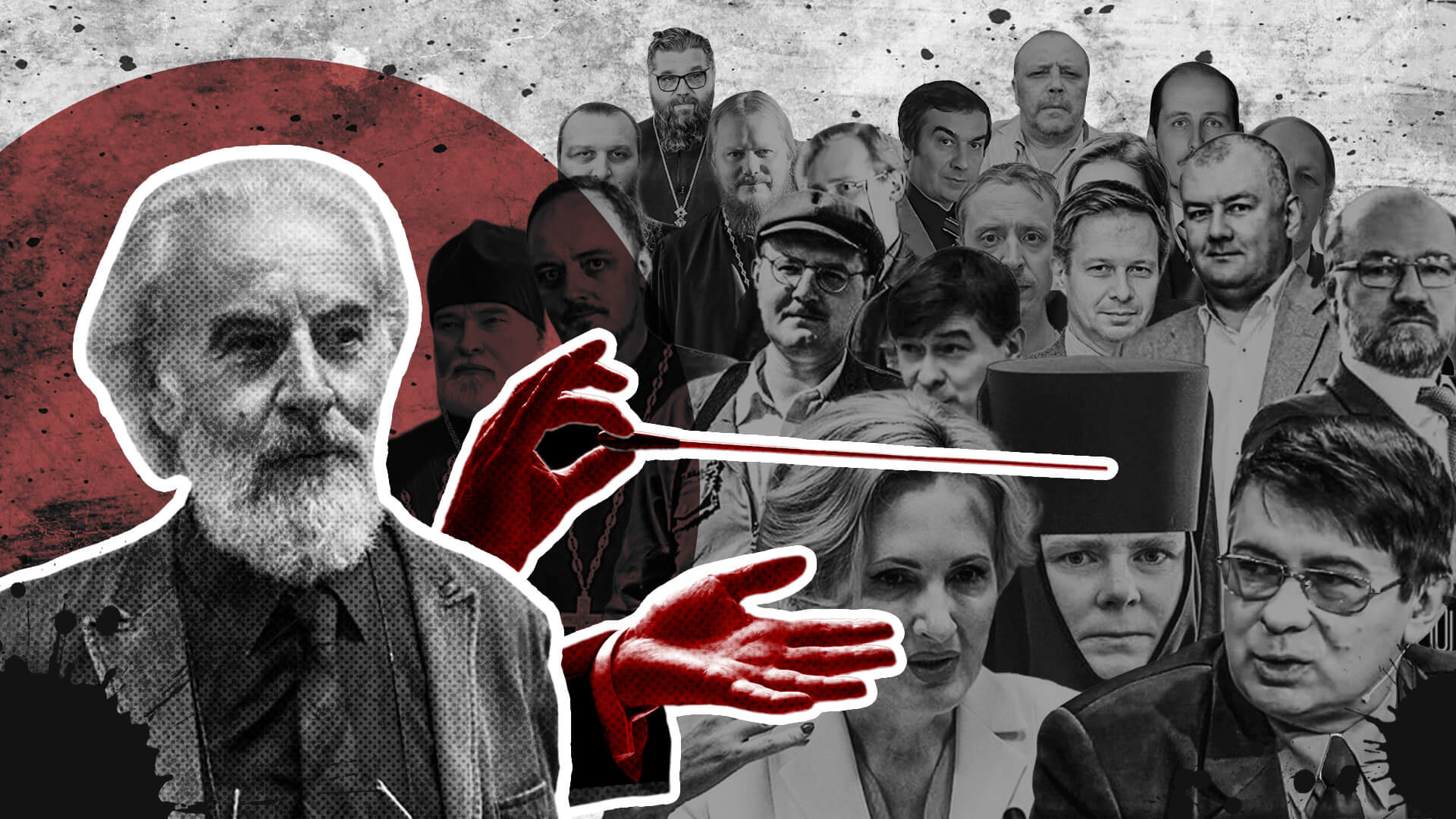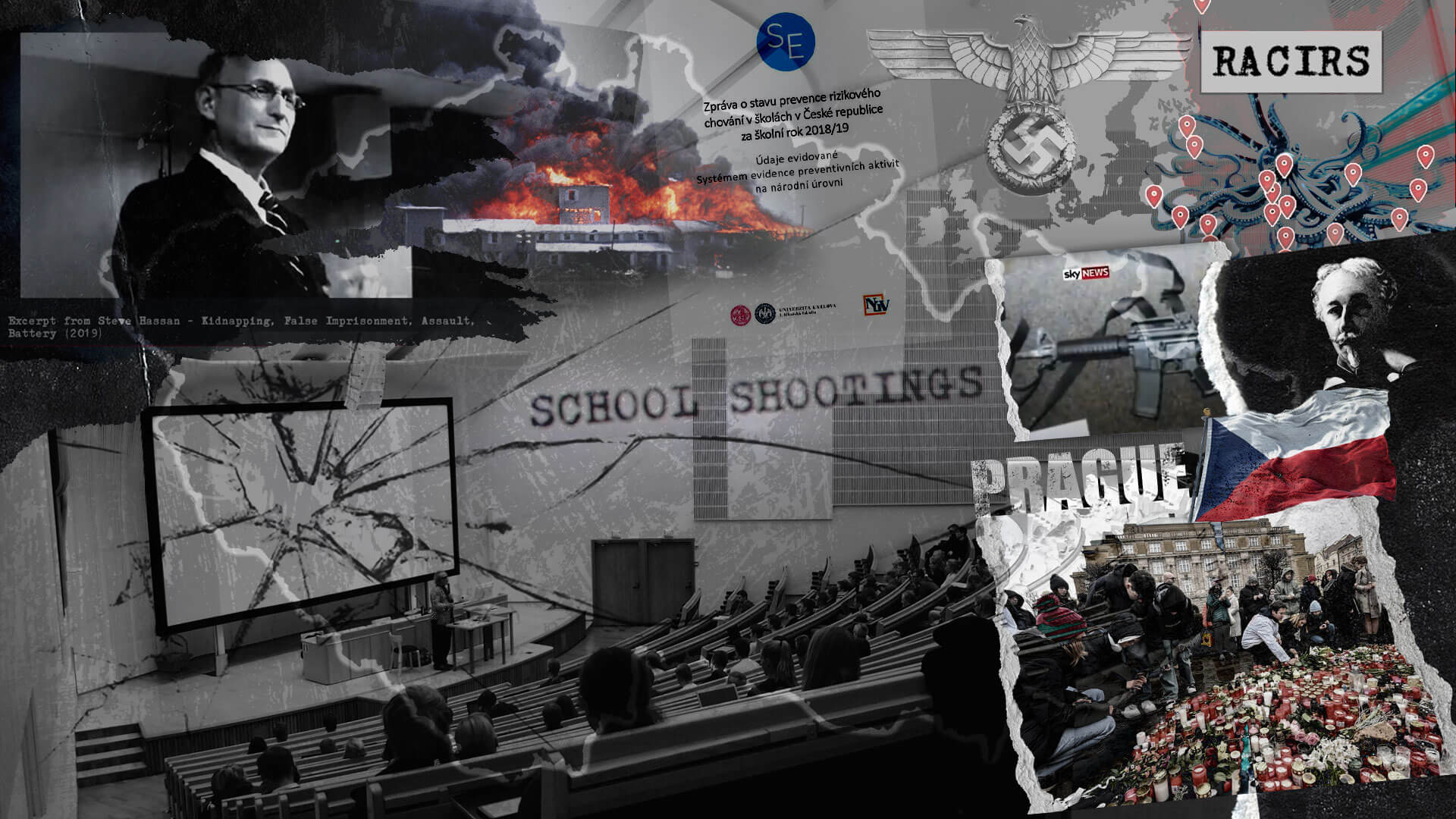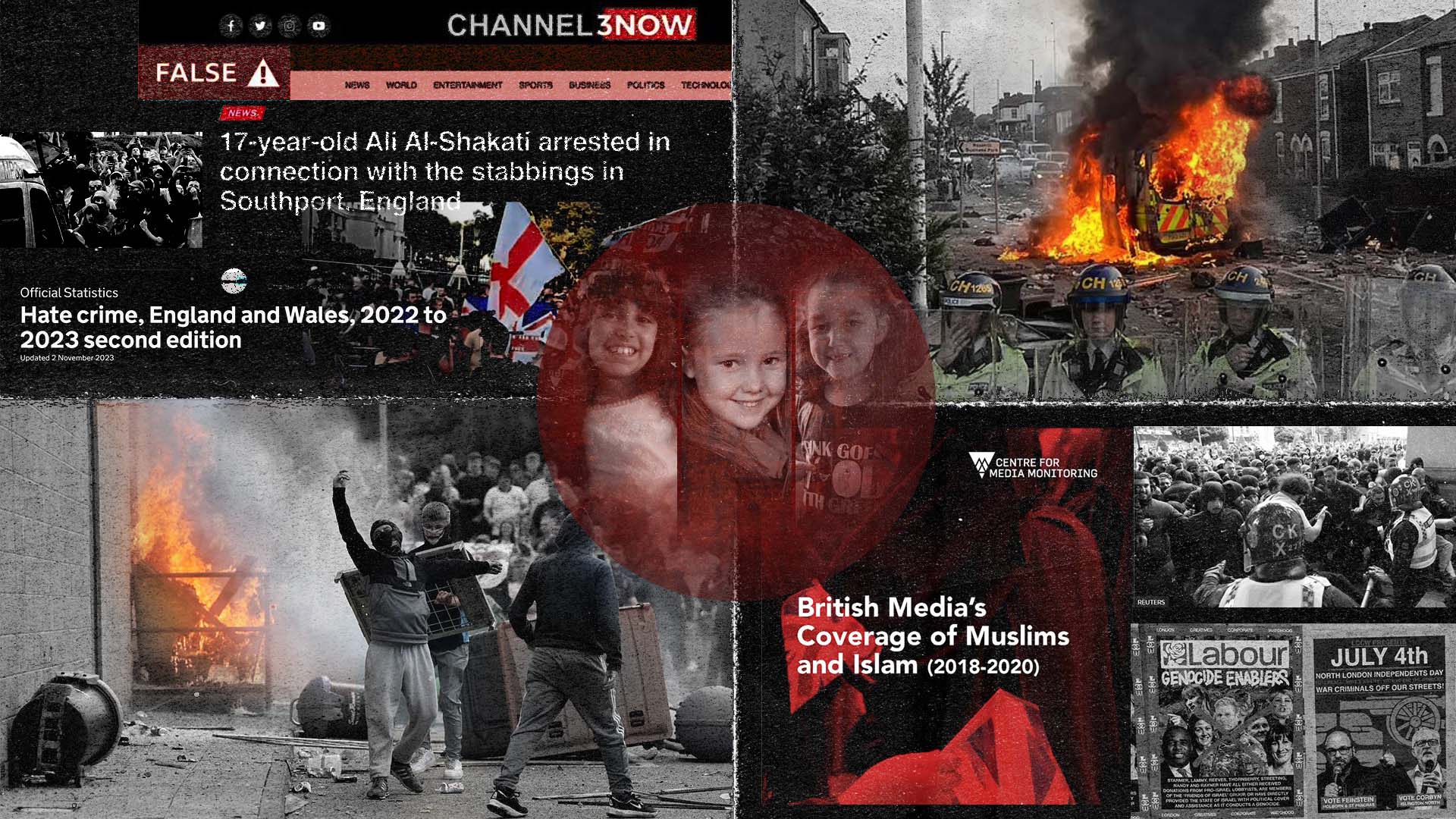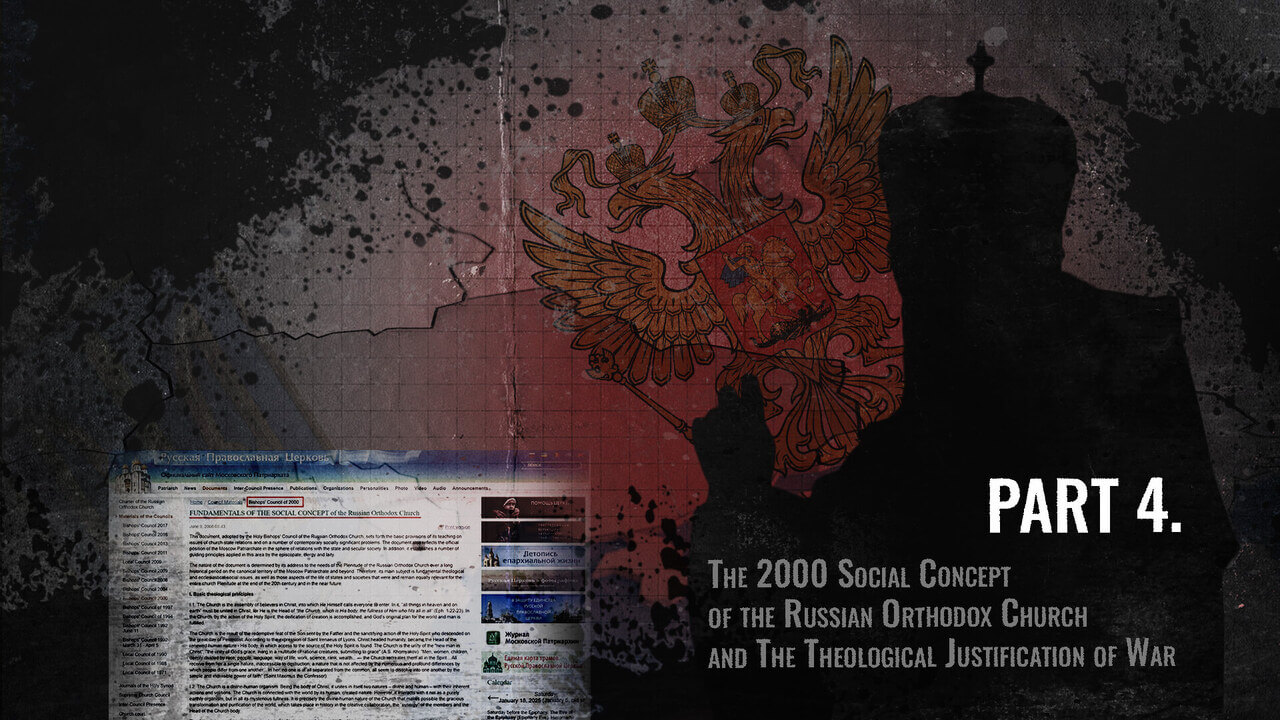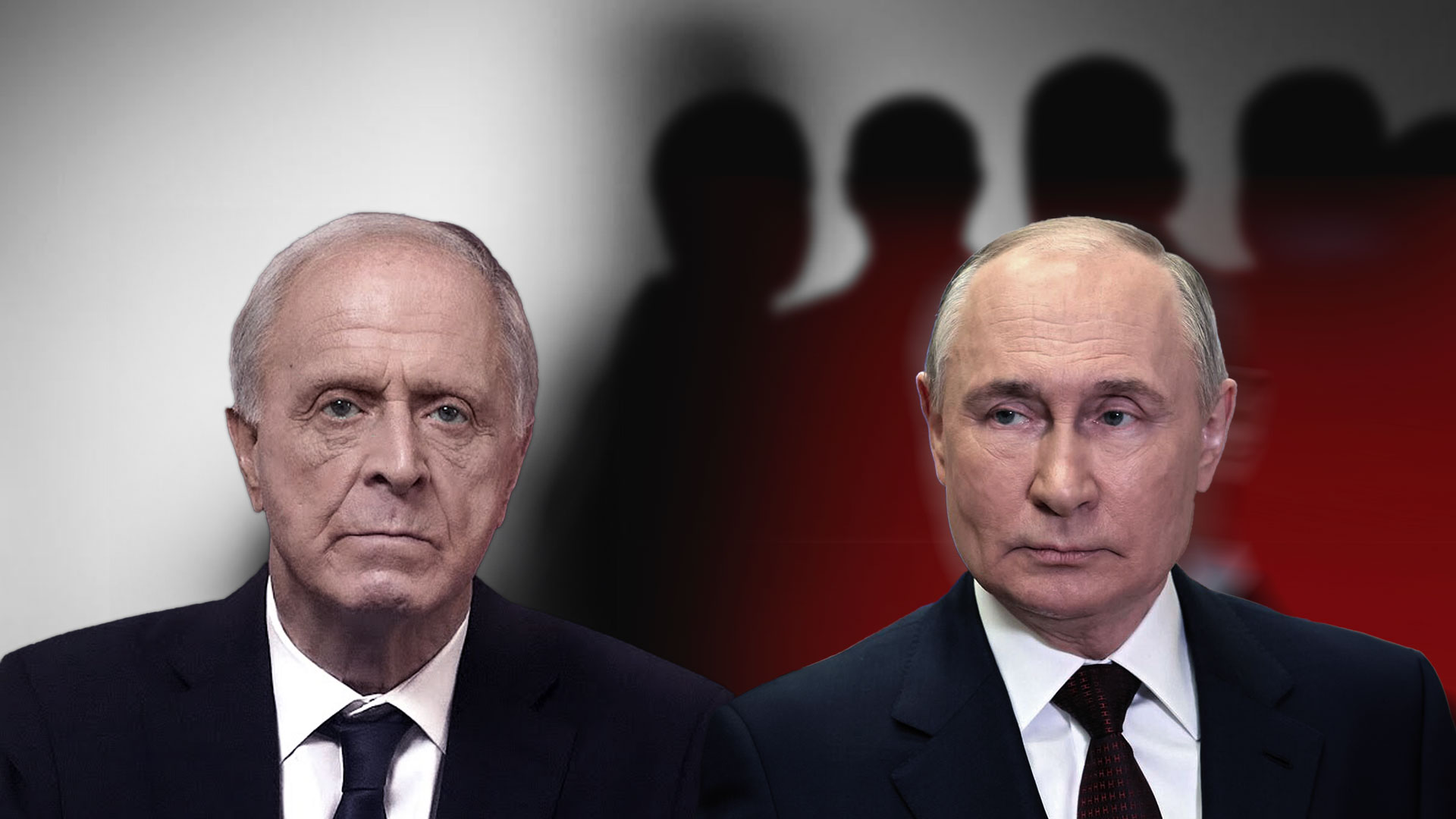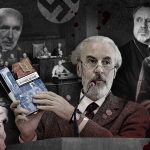Alexander Dvorkin is a key figure in the international anticult movement. It’s difficult to gauge the full extent of the damage inflicted on society by this religious apologist obsessed with radical ideas, who has a documented diagnosis of a mental illness from his young years. Likewise, it is currently impossible to fully and objectively analyze and structure the scope of actions of the terrorist organization RACIRS within the framework of a single article, given the complexity and multi-layered nature of its activities. You may have noticed: Dvorkin’s name appears in almost every third article we publish. Moreover, he is prominently featured in “The IMPACT” documentary, which underscores the importance and controversy of this figure. However, facts are being gathered and analytical work in this area continues, and in the future, we are likely to witness a high-profile trial, an international tribunal, where his role in dehumanizing society and instigating religious and interethnic conflicts will be carefully examined through deep, comprehensive analysis. As a lesson for future generations.
For now, let’s try to outline some preliminary points.
Russia’s Chief Anticultist
Continuing on the topic of ideological continuity, it’s notable that in the early 1990s, after returning from living abroad, Alexander Dvorkin became the vice-president of the Dialog Center. In this position, he effectively served as the representative of Johannes Aagaard and Friedrich-Wilhelm Haack in Russia, adopting their Nazi methods for combating “cults” firsthand. We have repeatedly discussed and provided documented, comparative evidence proving that these methods indeed have a Nazi origin. Dvorkin continued using destructive techniques to manipulate public opinion, suppress, and persecute dissenters — methods reminiscent of the prewar Nazi Apologetic Center in Germany. These techniques became the foundation of the Center for Religious Studies in the name of Hieromartyr Irenaeus, Bishop of Lyons 1, Russia’s first anticult organization, which Dvorkin founded and led in 1993, later transforming it into an ideological hub for modern anticultism in Russia. The center was established under the auspices of the ROC (Russian Orthodox Church) and received significant financial support from both the ROC and the Russian government. Using this center as a base, in 2006 Dvorkin founded RACIRS (Russian Association of Centers for the Study of Religions and Sects). Like other contemporary anticult organizations, RACIRS was modeled after the Nazi Apologetic Center and employed similar methods and ideology, only adapted to modern conditions. Following the example of his predecessors, Dvorkin also compiled “blacklists” of unwanted organizations and branded them as “totalitarian sects”, thus echoing Nazi-era rhetoric used to target dissenters and Jews.
Alexander Dvorkin began teaching “cult studies” at an Orthodox university despite lacking specialized qualifications, and he was the first to introduce the term “totalitarian sect” (destructive cult). This term later gained widespread use as a universal tool for dehumanizing and persecuting law-abiding citizens in Russia.
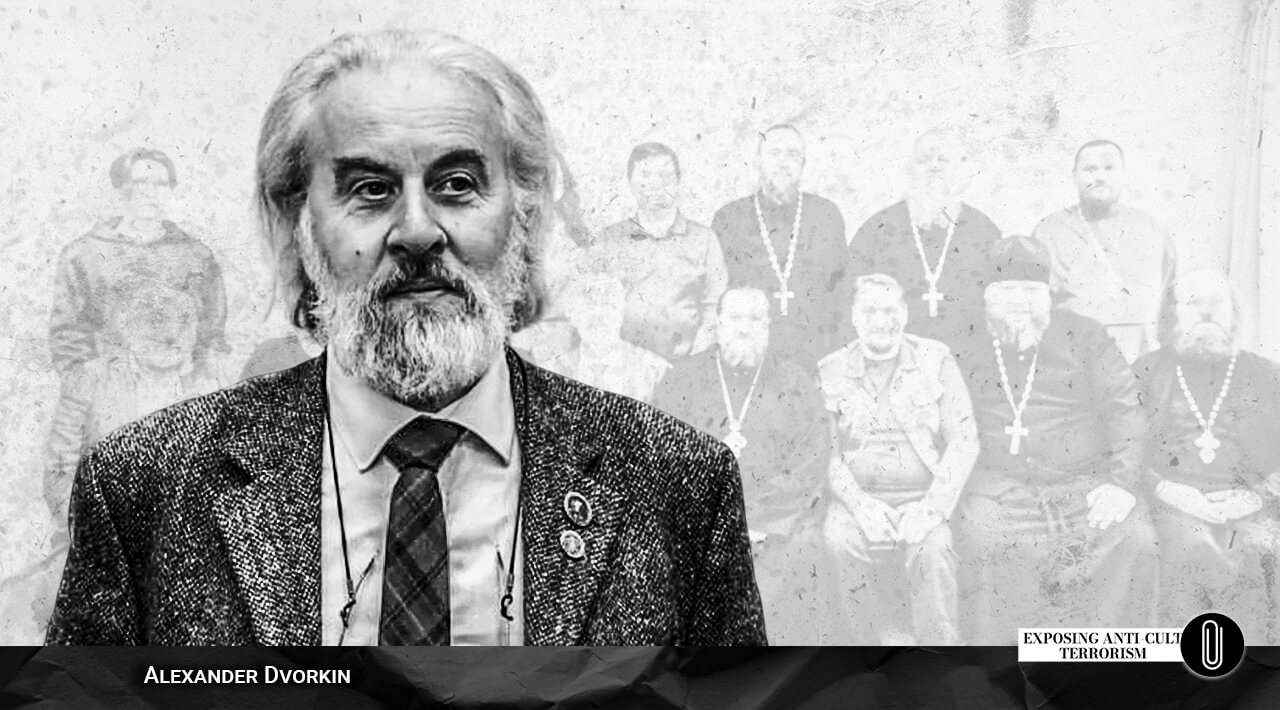
In the report by Jason Morton, “The Anti-cult Movement and Religious Regulation in Russia and the Former Soviet Union” (2020), it’s noted that the anticult movement in Russia, led by figures like Dvorkin, has gained significant influence in religious and political spheres. This influence was made possible through legislative initiatives, support from the Russian Orthodox Church (ROC), and the political will of the state, leading to strengthened positions of anticult organizations and substantial restrictions on religious freedom in the country. 2
Integration of Anticultism into Russia’s Legislation and State Policy
Dvorkin’s ideas, much like those of Künneth in his time, found support in the government eager to increase its control over society. In 1997, the “Law on Freedom of Conscience and Religious Associations” was enacted, restricting the activities of new religious movements. In 2002, an anti-extremism law was introduced, allowing for the persecution of religious organizations and greatly expanding the authority and influence of Dvorkin and other anticultists. In 2009, Dvorkin was appointed head of the government’s Expert Council on State Religious Evaluation. The rhetoric of the anticult movement and the Russian state grew closer. Much like the Apologetic Center during the Nazi era, the Center for Religious Studies in the name of Irenaeus of Lyons under the auspices of the Russian Orthodox Church, became the key reference point for Russian authorities in determining which religious associations should be deemed “cults”, “sects”, and potential threats to state ideology.
Evgeny Mukhtarov, press secretary of the Center for Religious Studies in the name of Irenaeus of Lyons, mentioned this in an interview:
“I keep getting these calls all the time — from the Prosecutor’s Office, the Ministry of Internal Affairs, and the FSB, “Evgeny, tell us — is this a cult or not?” and so on. Well, I’m exaggerating a bit…
Journalist: So, you explain to them what counts as a cult and what doesn’t?
Evgeny Mukhtarov: Well, I’m not the sole possessor of ultimate truth; I always make it clear that this is just my point of view…
Journalist: So, you consult them on matters of religious studies?
Evgeny Mukhtarov: Yes, right. Or they’re just asking, like recently someone called, “Evgeny, what is the correct way for Orthodox Christians to cross themselves?” It even comes down to that.
Journalist: And why don’t they ask the Orthodox themselves, but come to you?
Evgeny Mukhtarov: Mukhtarov, sort of, knows everything (laughs).”
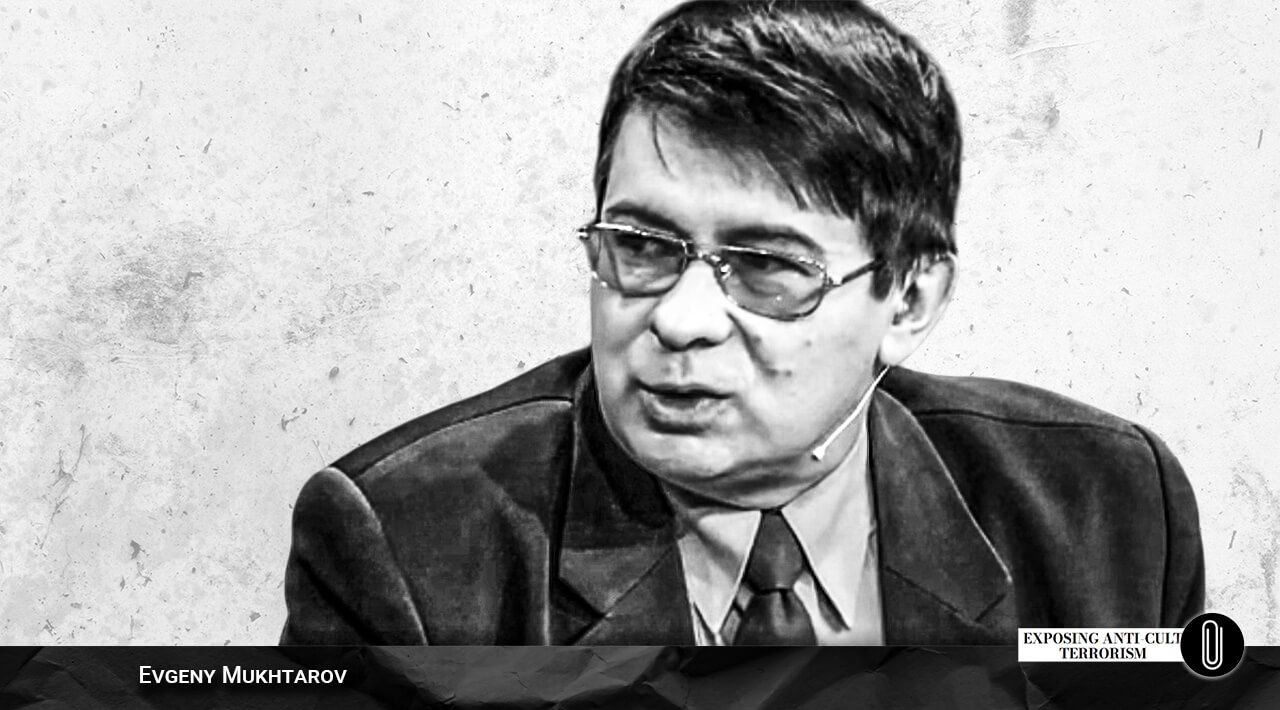
Expert Council on State Religious Evaluation under the Ministry of Justice of the Russian Federation
In 2009, the Expert Council underwent scandalous changes when Alexander Dvorkin assumed leadership. This marked a turning point that granted the anticult movement in Russia unprecedented authority. Along with the council’s restructuring came an expansion of its powers that surpassed legal boundaries.
Let’s examine this in more detail.
We’ll begin with the perspective of scholars and human rights advocates: the Expert Council on Religious Evaluation must be independent rather than state-run. Only then can it maintain genuine impartiality and objectivity. The council should be composed of religious studies experts and legal professionals specializing in relations between the state and religion, who are committed to an objective approach that respects universal moral standards, tactfully addresses the beliefs of different faiths, and upholds the spirit and letter of the law. Only under such conditions can the council’s expert findings be accurate and respected in the religious, legal, and academic communities.
Previously, no council member had religious affiliations. After the restructuring, however, full-time church workers, priests and parishioners of the ROC (Russian Orthodox Church) joined the council in significant numbers, who were not religious scholars by education or professional experience. The absence of globally recognized linguists in the Council also cast doubt on the validity of future evaluations.
Dvorkin himself was a particularly objectionable figure at the time. In the existing list of specialties of the Higher Attestation Commission, there is no such specialty as “sectologist”. In the opinion of scientists and religious scholars, it belonged not to the scientific, but to the anti-scientific area. Those who could challenge Dvorkin’s opinion with confidence were excluded from the new council. Many anticipated that the reorganization and empowerment of the council would lead it to act as a punitive body, which ultimately became the case.
There is no doubt that such a “risky and sharp maneuver” could have been achieved thanks to lobbying of the RACIRS interests from the top. Recall that a year earlier, Alexander Konovalov had assumed the post of Minister of Justice of the Russian Federation.
The connection between Dvorkin and Konovalov was easy to establish: according to Valery Otstavnykh, a former RACIRS member, in an interview for Radio Liberty 4, Konovalov was Dvorkin’s student at Saint Tikhon’s Orthodox University of Humanities. Thus, it can be concluded that Konovalov is, in all likelihood, Dvorkin’s associate.
Quote:
“The Minister of Justice of the Russian Federation is Mr. Konovalov,” says V. Otstavnykh, “a graduate of the same university as myself. He studied under Alexander Leonidovich Dvorkin, who believes that all religious organizations besides the Russian Orthodox Church and traditional confessions are sects and cults that should be banned through judicial measures.”
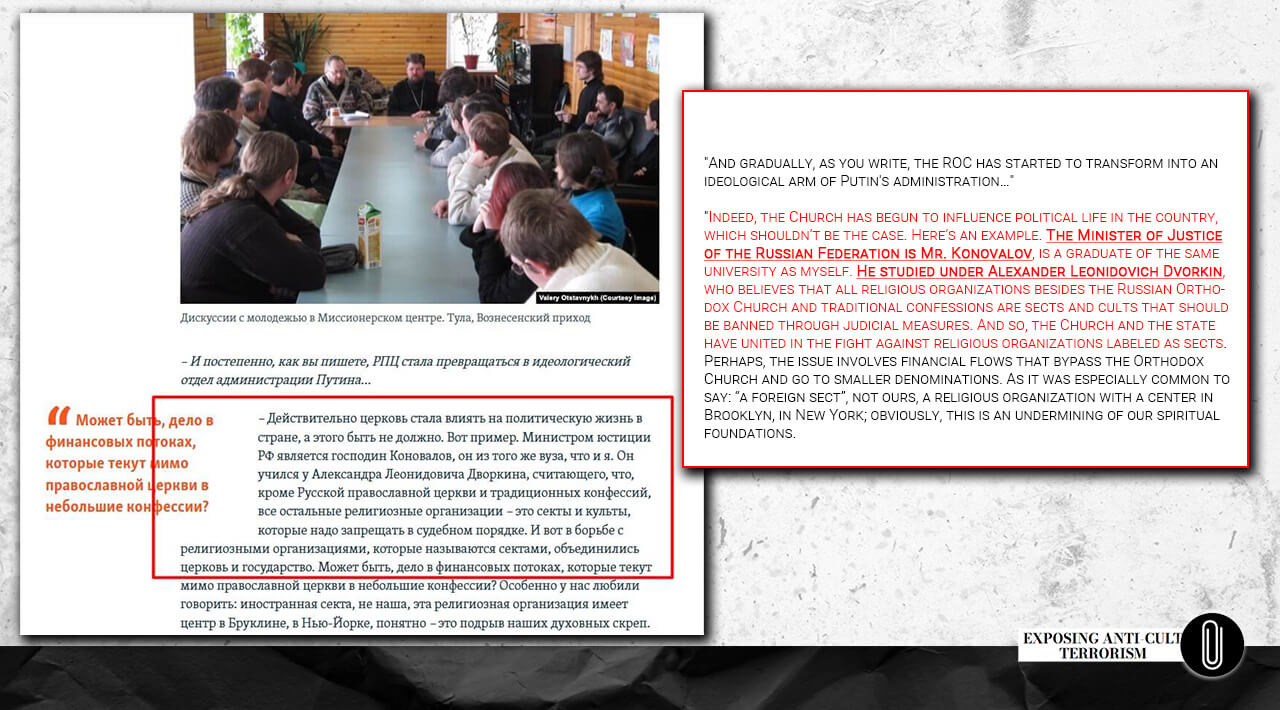
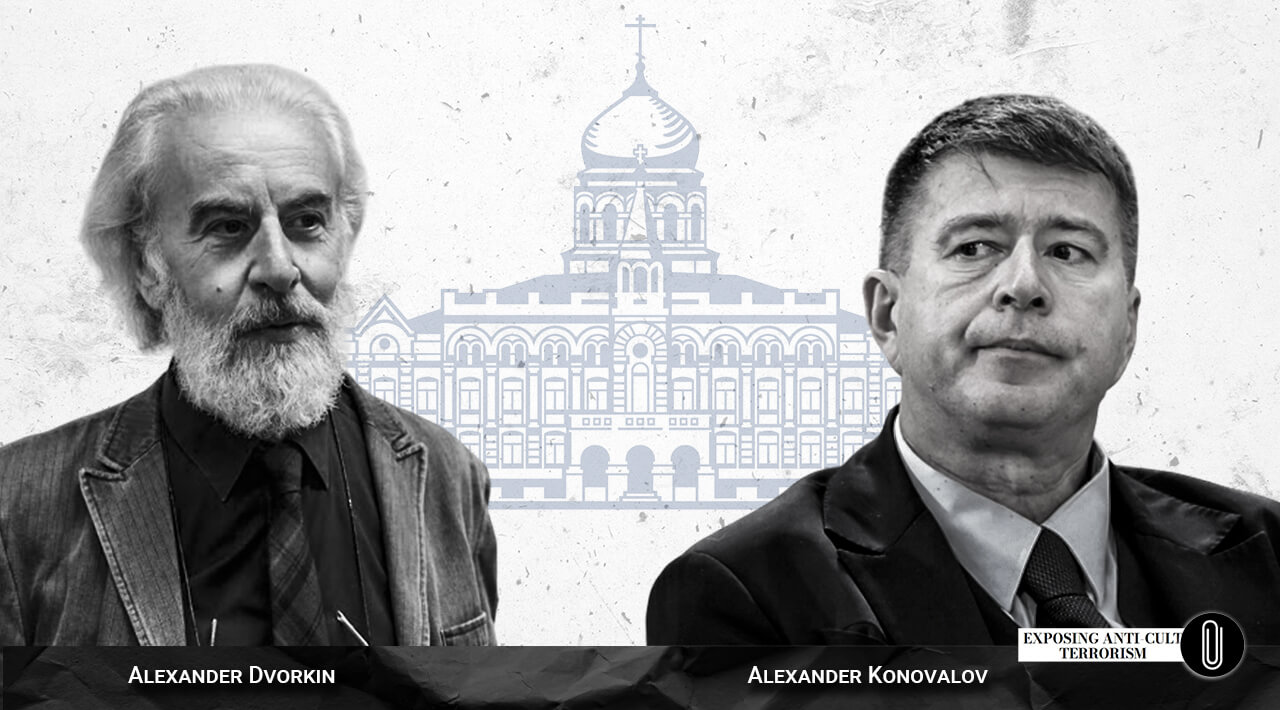
There’s also a well-known photograph from the 2009 FECRIS international conference in St. Petersburg, showing Konovalov standing next to Dvorkin:
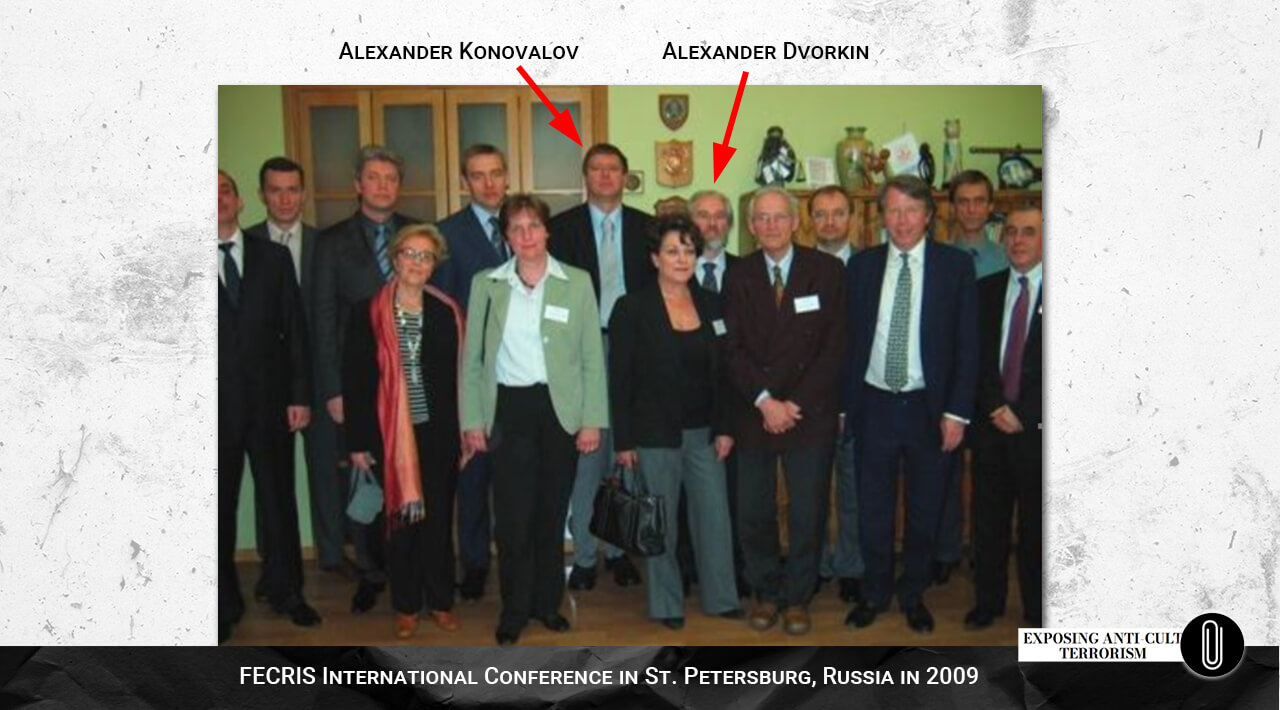
Among others, the following figures were included on the expert council:
- Alexander Dvorkin, head of the Center for Religious Studies in the name of Hieromartyr Irenaeus of Lyons;
- Lev Semenov, staff member at the Center for Religious Studies in the name of Hieromartyr Irenaeus of Lyons, priest of the Russian Orthodox Church, and associate professor at the Department of Missiology, Orthodox Saint Tikhon’s University of Humanities;
- Alexander Kuzmin, head of the Saratov branch of the Center for Religious Studies in the name of Hieromartyr Irenaeus of Lyons;
- Evgeny Mukhtarov, Yaroslavl-based journalist and sectologist, press secretary at the Center for Religious Studies in the name of Hieromartyr Irenaeus of Lyons;
- Andrey Vasilchenko, sectologist from Yaroslavl, longtime friend of Mukhtarov, specialist in German fascism, and author of numerous popular books on the history of the Third Reich;
- Roman Silantiev, a well-known anticultist, creator of the pseudo-science “destructology,” and Dvorkin’s associate, currently heading the Human Rights Center of the World Russian People’s Council;
- Alexander Savvin, specialist on modern Satanism, professor in the Department of Philosophy of Religion and Religious Aspects of Culture at the Faculty of Theology of Saint Tikhon’s Orthodox University of Humanities, where Dvorkin taught and the Minister of Justice Konovalov studied;
- A.D. Redkozubov, teacher of religious studies at the Department of Missiology, Saint Tikhon’s Orthodox University of Humanities.
The council also includes Alexander Shchipkov, political philosopher, sociologist of religion, and public figure who now serves as the deputy head of the World Russian People’s Council, led by the Patriarch Kirill (Vladimir Gundyaev) from the Russian Orthodox Church.
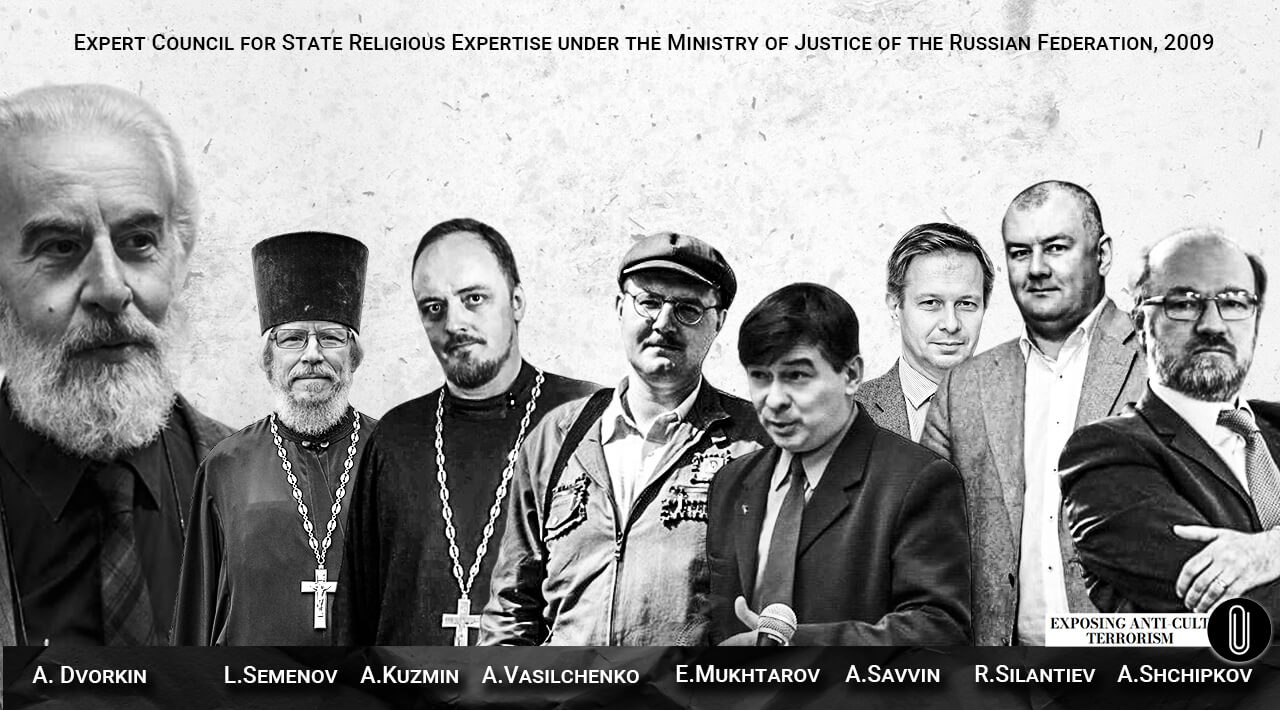
We were extremely surprised to find on this list the writer Andrey Vasilchenko, a sectologist from Yaroslavl and longtime friend of Mukhtarov, who has written many books on German fascism! In other words, his entire professional work was dedicated to Nazism.
We believe it’s worth listing Vasilchenko’s books here:
- Hitler’s ‘European Union’
- The Ahnenerbe. ‘Ancestral Heritage’. Without Myths and Mysteries
- Heralds of the ‘Ancestral Heritage’
- Fashion and Fascism
- The Sexual Myth of the Third Reich
- Sex in the Third Reich
- The SS Mysticism
- The Thule Society
- Secret Bases of the Third Reich in Antarctica
- Himmler: Inquisitor in Glasses
- Himmler’s Court Magician
- Sonderkommando X: Himmler’s Witchcraft Project
- Secret Societies of the Third Reich
- New Templars: Spiritual Advisors of the Black Order
- Dr. Goebbels’ Projector
- Imperial Tectonics: Architecture of the Third Reich
- Secrets of the Black SS Castles
- Hitler’s Penal Battalions: The Wehrmacht’s ‘Living Dead’
- Nordic Olympians
- Incubator for True Aryans: ‘Lebensborn’
- Aryan Myth of the Third Reich
- Occult Myth of the Third Reich
- Hitler’s Last Hope
- The Last Fortress of the Reich
- The SS Tibetan Expedition: The Truth about a Secret German Project
- Aryan Realism: Creative Arts in the Third Reich
- Clans at War: ‘Black Front’ vs. NSDAP
- History of the Hitler Youth
- Between Duce and Hitler
- ‘Panzerfaust Infantry’ in Battle
- Hitler’s Last Offensive: The Defeat of the Reich’s Tank Elite
- Stonehenge of the Third Reich
- ‘Lili Marlene’ and More: The Third Reich’s Stage
- Tank Ace No. 1: Michael Wittmann
- And others
We’ve provided this extensive list of publications for a reason. Clearly, for Vasilchenko, the history of Hitler’s fascism was more than just a hobby — it was a source of inspiration. It’s astonishing that a person with such interests and knowledge level would end up in the Expert Council for State Religious Studies under the Russian Ministry of Justice.
It’s evident that Andrey Vasilchenko was brought into the council by Evgeny Mukhtarov, head of RACIRS’ press office.
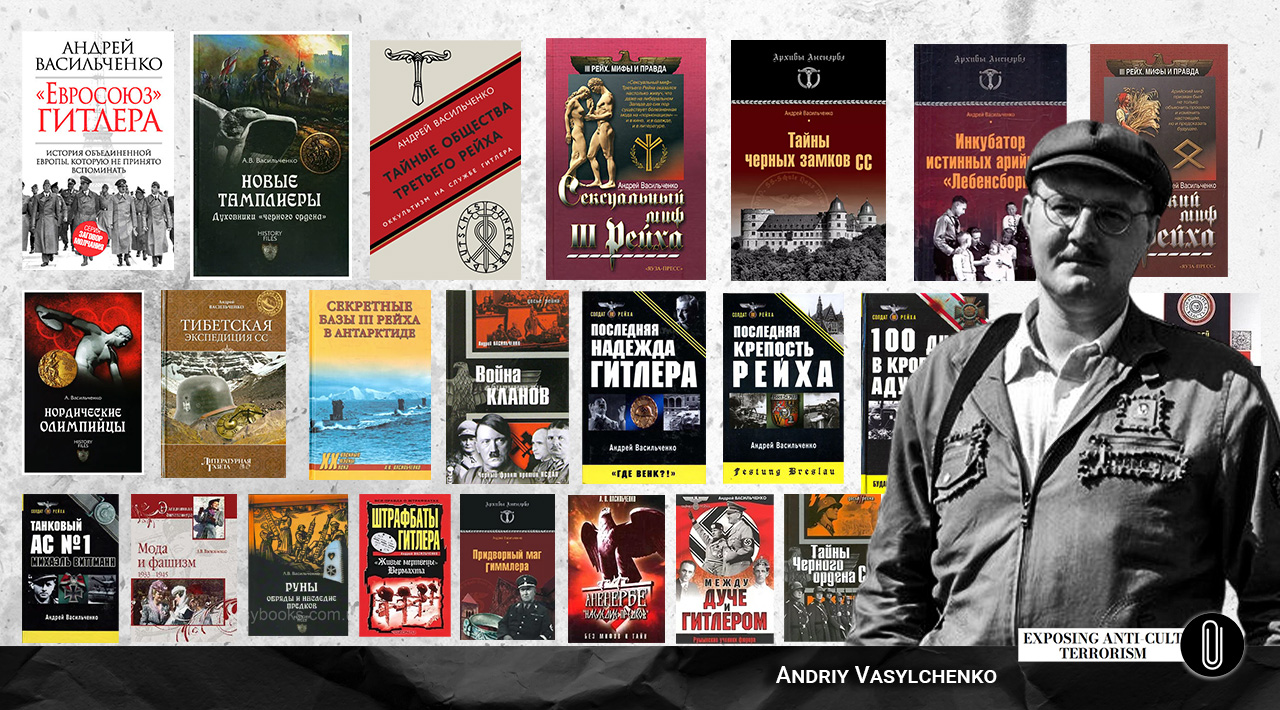
In addition, we would like to remind you once again that Alexander Dvorkin, the head of the council himself, had been a patient at a psychiatric dispensary for a long time, as it follows from the published medical documents previously leaked on the Internet. The patient was removed from the psychiatric register without a doctor’s approval due to Dvorkin’s immigration to the United States. The revealed disorders make the patient incapable of scientific, social or political activities of any kind due to extreme subjectivity of perception and inability to adequately evaluate the consequences of his actions or take responsibility for them.


That’s how “independent” and “unbiased” the council turned out to be.
Does russia need an inquisition court?
Does Russia need an Inquisition court? It was under such a loud slogan that a subsequent conference in Moscow was held, attended by scholars, legal professionals, and religion experts.
“The action we’re looking at today serves the opposite purpose; it is aimed at division, sowing discord within society, and pitting parts of the public against each other. That’s the first point. The second is that the issue goes beyond just the council. The Ministry of Justice arrogates, and partially delegates to the council, powers that it cannot have by the law. It states: “control over religious associations’ activities”. How so? Even in Soviet times the Council for Religious Affairs had no right to control the activities of religious associations. “Control over religious organizations’ declared forms and methods”. What right does anyone have to demand from a religious association to detail its forms and methods in a charter? It’s their internal matter. The Constitution separates religious organizations from the state, which means the state does not interfere with their internal structure or decisions.” 3 (Remir Lopatkin — professor, Department of State-Confessional Relations at the Russian Academy of State Service).
Anatoly Pchelintsev, editor-in-chief of the journal Religion and Law and an honorary attorney of Russia, also questioned the council’s competency:
“Honestly, it’s hard to imagine a less professional body. Of the 24 members on the council, we hardly found any qualified religious scholars or scientists, except for two. The rest are journalists, engineers — people far removed from science. Among them are even extremists, and I have legal grounds for that claim. Recently, the Central Court of Khabarovsk, in response to a case by the Khabarovsk prosecutor, ruled one of the leaflets to be extremist material. The author of this leaflet is none other than Kuzmin A.V., one of the adherents of a pseudo-Orthodox cult led by Mr. Gorkin, operating in Saratov Oblast. His leaflet incites religious hatred and hostility.”
The head of the Expert Council under the Ministry of Justice, Saint Tikhon’s Orthodox University professor Alexander Dvorkin, received a special mention. Another conference participant, Professor Ekaterina Elbakyan from the Academy of Labor and Social Relations, commented:
“I was honestly shocked to find that Mr. Dvorkin, who lacks not only personal qualities but also any formal religious studies education, chairs this Expert Council on State Religious Evaluation. Only one member, Igor Yablokov, has a religious studies education. I was, to say the least, extremely surprised.”
While the Russian Orthodox Church supported the creation of the new Expert Council under the Ministry of Justice, representatives of Russia’s Muslim community expressed concerns about the qualifications of its members. In one of his speeches, Chairman of the Russian Council of Muftis Ravil Gainutdin noted that the council’s activities wouldn’t have any significant influence on Russia’s Muslim community due to the lack of authoritative specialists in Islamic studies on the council.
The Expert Council frequently faced criticism for its lack of objectivity and scientific rigor in its evaluations. Many of its decisions were questioned for their legal and academic validity. Critics argued that its assessments often displayed a clear bias toward state and church interests, particularly in its close ties with the Russian Orthodox Church. This raised concerns about conflicts of interest and the violation of the state’s neutrality on religious issues, as mandated by the Russian Constitution.
Moreover, under Dvorkin’s leadership, the council’s activity has been linked to a rising number of court cases against religious minorities, such as Jehovah’s Witnesses, Scientologists, and others. In these cases, the council’s “expert conclusions” were used to justify bans, arrests, and prosecutions of these groups. Human rights advocates viewed this as an infringement on the right to freedom of conscience and religion, a right upheld by international legal norms and the Russian Constitution. Apparently, the Expert Council under Dvorkin’s leadership appeared to function not as a body for objective analysis of religious movements but as a tool for suppressing religious freedoms in Russia.
In conclusion, let us mention a brief example with charges of extremism against the ancient text “Bhagavad Gita.” Professor Ekaterina Elbakyan, Ph.D., included a passage on this topic in her work, “The Importance of Independent Religious Studies Expertise in Modern Russian Justice.” 8
Let us quote:
“The example of accusing the Bhagavad Gita of extremism highlights the absurdity of a situation where courts have no clear sense of who qualifies as an expert and who absolutely does not. Last summer, Russian Vaishnavas approached me with a request to help analyze an ill-informed, clearly commissioned expert review. I reviewed this so-called ‘expert analysis,’ where the extremist nature of the book ‘Bhagavad Gita As It Is’ was concluded solely based on Prabhupada’s call to pray to Lord Krishna, and I found the authors to be completely incompetent. I then formulated an expert evaluation of this ‘analysis,’ highlighting its dubious nature, direct mistakes, and erroneous conclusions. Professor Ivanenko S. I. conducted a similar review on his part. The judge, interested in obtaining a reliable expert analysis, kept the trial going for quite some time, but eventually, the baseless charges against the ancient book and its commentary were finally dropped.”
The Consequences of Dvorkin’s Anticult Policy
In 2016, Russia passed the ‘Yarovaya Law’, significantly restricting the activities of religious organizations. The package of anti-terrorism laws, authored by deputy Irina Yarovaya and senator Viktor Ozerov, imposed a ban on missionary activities aimed at violating public security and order, extremist actions, coercion to family breakdown, encroachment on the personality, rights and freedoms of citizens.
The head of the Legal Department of the Moscow Patriarchate, Abbess Xenia (Chernega), explained that, according to the Russian Orthodox Church, the law ‘will apply to nontraditional religious groups‘ 5.”
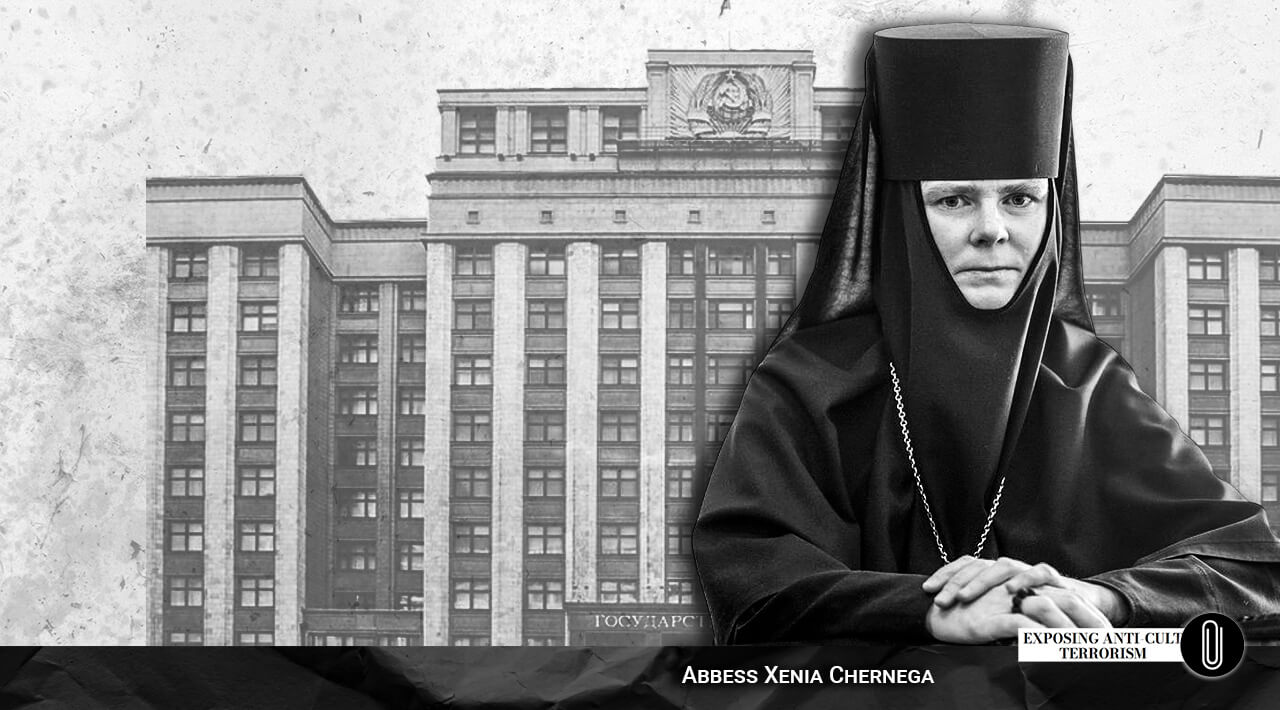
By 2017, Jehovah’s Witnesses were banned in Russia as an “extremist organization.” Once again, it is worth noting that the anticult movement received financial support from the Russian Orthodox Church and the Russian government. Thus, initially targeting new religious movements, the anticult movement in Russia, similar to that in Nazi Germany, gradually became an instrument of state policy used to restrict religious freedom, persecute minorities, and even justify military aggression, which will be discussed in more detail in our upcoming articles.
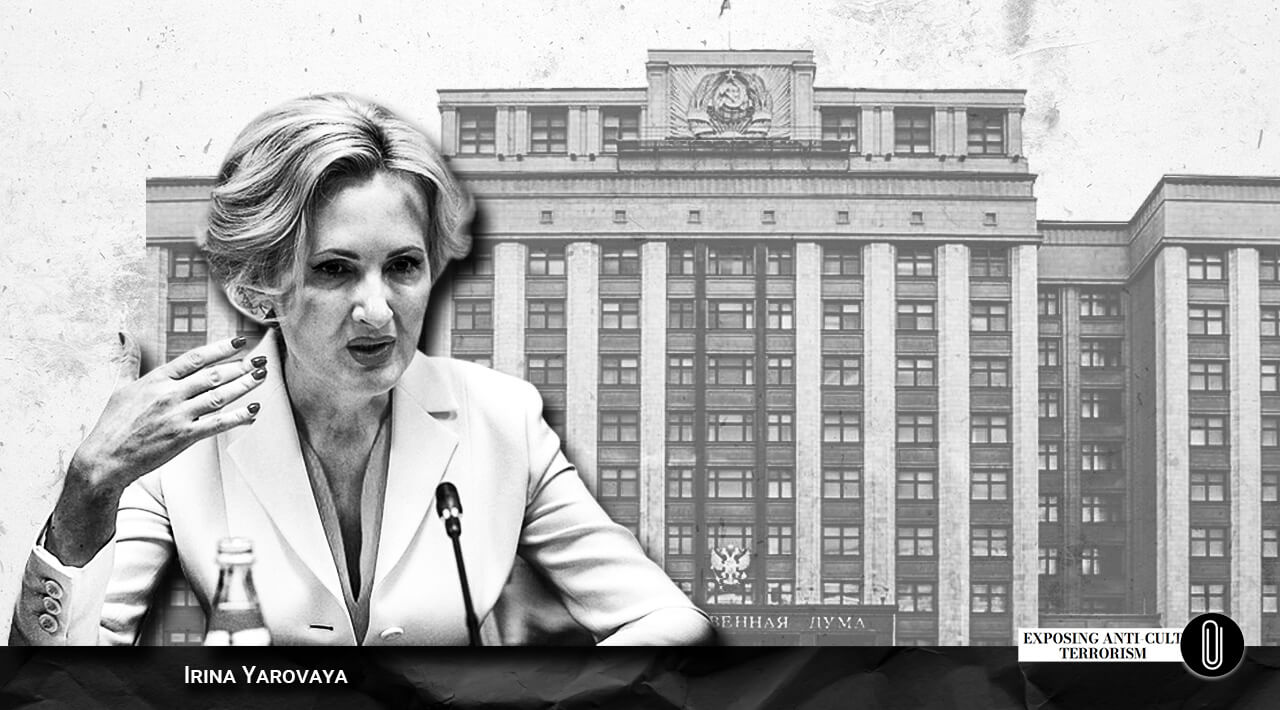
RACIRS seeks to continually expand its influence
The Russian Association of Centers for the Study of Religions and Sects, known as RACIRS, includes various regional centers dedicated to countering “sectarianism” (“cultism”). These centers are backed by a wide array of psychologists, missionary priests, and bloggers who give lectures, produce broadcasts, and go live on air. They do not invent new things, they repeat old ones, using the pseudoscientific works of figures like Dvorkin, Hassan, and others as the basis.
Here is a list of anticult activists, most of whom act as RACIRS agents. The key figures and agents of RACIRS include several well-known Russian, Ukrainian, and Belarusian sectologists who closely collaborate in anticult activities, highlighted here in bold.
First, it’s worth mentioning that in 1993, as records show, the anticult work in Russia began with Dvorkin and just a few others: Alexander Novopashin, Dmitry Smirnov, and Andrey Kuraev. Over the past thirty years, the number of supporters concerned with the mythical dangers of small religious movements has significantly grown. Just consider:
RUSSIA:
- Alexander Dvorkin…
- Andrey Kuraev – began anticult activities with Dvorkin
- Archpriest Dmitry Smirnov – church and public figure, anticultist
- Roman Silantyev – anticultist, member of the World Russian People’s Council (WRPC)
- Lev Semenov – Executive Secretary of RACIRS
- Archpriest Alexander Novopashin – rector of the Alexander Nevsky Cathedral, head of the Missionary Department of the Novosibirsk Diocese, Vice-President of RACIRS
- Archpriest Alexander Shabanov – Vice-President of RACIRS
- Alexander Korelov – attorney with RACIRS
- Dmitry Baharev – member of the Legal Committee for the Protection of Rights and Dignity of the Individual at RACIRS
- Hieromonk Mikhail Plotnikov (Vice-President of the Center for Religious Studies in the name of Hieromartyr Irenaeus of Lyons) – Candidate of Theology, Associate Professor at the Department of Religious Studies at Saint Tikhon’s Orthodox University of Humanities (PSTGU)
- Evgeny Mukhtarov – sectologist from Yaroslavl, press secretary for RACIRS
- Priest Alexander Kuzmin – Executive Secretary of RACIRS, editor of antiCEKTA.ru website
- Sergey Chapnin – journalist, publisher, church and public figure
- Archpriest Arseny Vilkov – Vice-President of RACIRS (Ryazan)
- Archpriest Georgy Ioffe – Vice-President of RACIRS (St. Petersburg)
- Archpriest Viktor Gorbachev – Vice-President of RACIRS (Yuzhno-Sakhalinsk)
- Evgeny Volkov – psychologist, Russian anticultist
- Alexey Volkov – catechist, Russian anticultist
- Konstantin Putnik – former head of the RACIRS anticult center in Chelyabinsk
- Igor Ivanishko – Russian sectologist
- Larisa Astakhova – Russian sectologist
- Archbishop Sergey Chashin (Salekhard)
- Andrey Hvilya-Olinter – priest, criminologist, theologian, anticultist
- Sergey Vershinin, Alexander Bradikhin, Irina Shchetinina – members of the “Improper Experts” group, regularly participating in RACIRS anticult activities
- Alexander Neveev – Russian anticultist
- Vadim Rozenfeld – RACIRS member (Ufa)
- Alexander Goryunov – anticultist, anti-extremism advocate (Yaroslavl)
- Roman Kon – Russian anticultist, author of Introduction to Sectology
- Vitaly Pitanov – psychologist, anticultist
- V.I. Prikhodko – sectologist and anticultist (Rostov)
- Priest Vyacheslav Rubsky – anticultist
- Alena Namliyeva – anticultist (St. Petersburg)
- Priest Nikolay Svyatchenko (St. Petersburg)
- Kristina Zolina (St. Petersburg)
- Priest Dionysius Efimov (Ufa)
- Archpriest Oleg Stenyaev – anticultist, head of the Alexey Khomyakov Center for Rehabilitation of Victims of Non-Traditional Religions
- Anthony Dulevich – head of the Missionary Department of the Kyzyl Diocese
- Priest Sergey Fufaev – Deputy Chairman of the Synodal Missionary Department of the Russian Orthodox Church for Apologetic Mission
- Andrey Solodkov – head of the “Prosvetitel” (“Enlightener”) Orthodox Missionary School of the Southwestern Vicariate in Moscow
- Priest Dmitry Berezin
- Priest Artemy Silvestrov
- Maksim Stepanenko – head of the Missionary Department of the Tomsk
- Diocese
- Alexey Yarasov – Secretary of the Missionary Department of the Tula Diocese
- Natalya Yarasova – psychologist, Tula Diocese Missionary Department of the Russian Orthodox Church (Moscow Patriarchate)
- Priest Vladimir Zaitsev – head of the Ekaterinburg Department
- Kazimieras Andriuškevičius (Lithuania)
- Denis Danilov (Arkhangelsk)
- Priest Pikalev (Vladikavkaz)
- Priest Evgeny Lishchenyuk (Voronezh)
- Priest Alexander Permyakov (Kaliningrad)
- Archpriest Alexander Sazonov (Volgograd)
- Ilya Khokhlov (Kaluga)
- Evgeny Udartsev (Kemerovo)
- Archpriest Dmitry Vladimirov (Kemerovo)
- Archpriest Andrey Yefanov (Kineshma)
- Priest Alexey Surikov (Moscow Region)
- Anton Tuchkov (Murmansk)
- Abbot Mikhail (Kiselev) (Murmansk)
- Archpriest Andrey Amelin (Murmansk)
- Priest Ilya Vanyukhin (Murmansk)
- Archpriest Igor Gaidayev (Novorossiysk)
- Alexander Chausov (Veliky Novgorod)
- Archpriest Artemy Shatov (Orenburg)
- Evgeny Oshmarin (Perm)
- Archpriest Alexey Morozov (Pereslavl-Zalessky)
- Priest Mikhail Neverov (Petropavlovsk-Kamchatsky)
- Priest Anton Skrynykov (Stavropol)
- Vladimir Storchak (Taganrog)
- Priest Alexey Samsonov (Tomsk)
- Priest Sergey Dudin (Tomsk)
- Priest Anthony Vasilyev (Bratsk)
- Sergey Fedorov (Cheboksary)
- Priest Ilya Lebedev – head of the Diocesan Department for Missionary Service and Counteraction to Sectarianism (Cheboksary)
- Svetlana Zamlelova – writer, anticultist
- Abbot Anatoly Berestov
- Olga Griva – anticultist, head of the Department of Religious Studies (Crimea)
BELARUS:
- Vladimir Martinovich – Belarusian sectologist, the anticultists’ “responsible person on the territory of Belarus”
- Protodeacon Andrey Gorbunov (Baranovichi, Belarus)
- Archpriest Artemy Krivitsky (Gomel, Belarus)
- Oleg Nagorny – anticultist (Belarus)
- Ekaterina Ageenkova – psychologist, anticultist (Belarus)
KAZAKHSTAN:
- Yulia Denisenko (Astana, Kazakhstan)
UZBEKISTAN:
- Priest Sergey Statsenko (Tashkent, Uzbekistan)
LATVIA:
- Viktor Yolkin
- Andrey Mamykin
- Oleg Nikiforov
- Svetlana Krilova
UKRAINE:
- Archpriest Alexey Volkov (Vinnytsia, Ukraine)
- Vasily Anisimov – head of the press service of the Ukrainian Orthodox Church (Ukraine)
- Alexey Chaplin – coordinator of the Zaporizhzhia branch of the St. John Chrysostom Apologetics Center (Zaporizhzhia, Ukraine)
- Pavel Broyde – political technologist and PR specialist from Zaporizhzhia. Until 2014, Broyde coordinated the activities of the All-Ukrainian Apologetics Center (AAC) under the Synodal Department for Youth Affairs of the Ukrainian Orthodox Church (Moscow Patriarchate). This center promoted Russian interests among Ukrainian Orthodox youth
- Vladimir Rogatin – director of the Mykolaiv Family and Individual Protection Center “Dialogue” (Ukraine)
- Archbishop Jonah of Obukhov (Ukraine)
- Archimandrite Luka (Vinarchuk) (Ukraine)
- Viktor Chernyshov – associate professor at the Kyiv Theological Academy and Seminary, expert on non-traditional sects (Ukraine)
- Irina Kremenovskaya – anti-sect activist from Ukraine, active participant in the Russian anticult movement
- Inna Sovsun – politician
- Grigory Globa (Dialogue Center, Dnipropetrovsk)
- Anatoly Yegorenkov – Bogomolets National Medical University, Kyiv (Ukraine)
- Archpriest Alexey Slyusarenko (Luhansk, LPR)
…

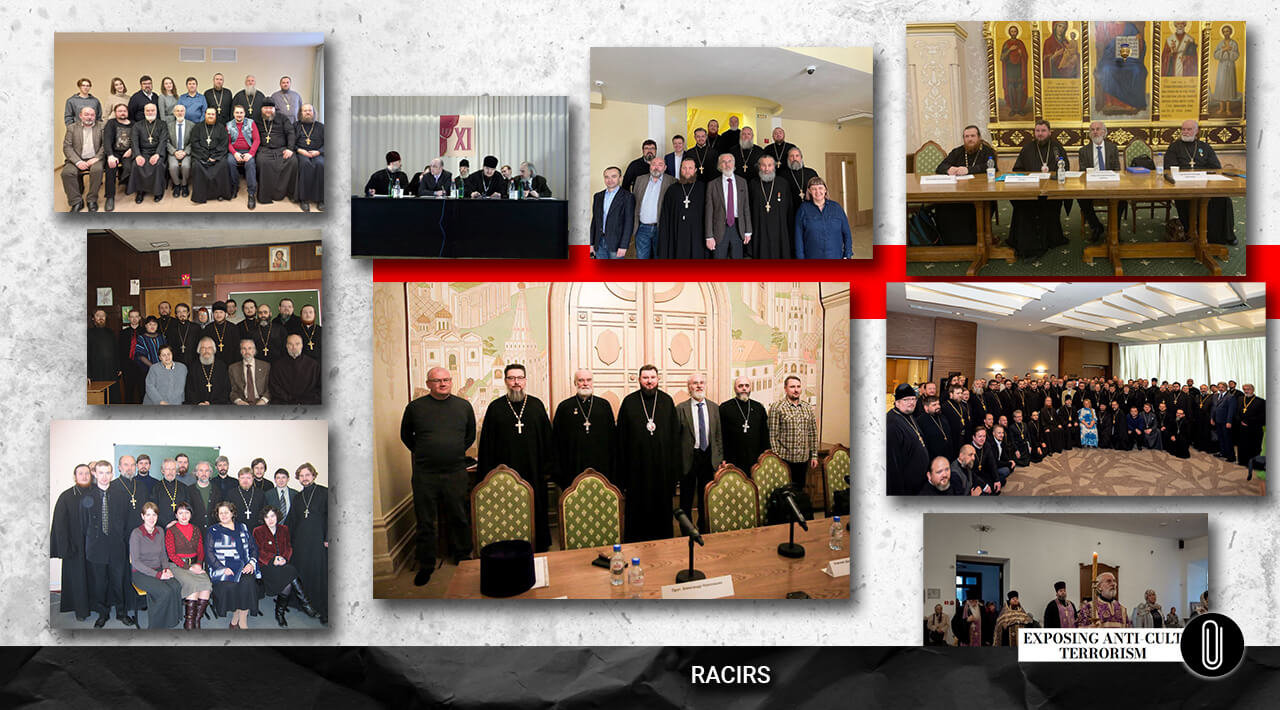
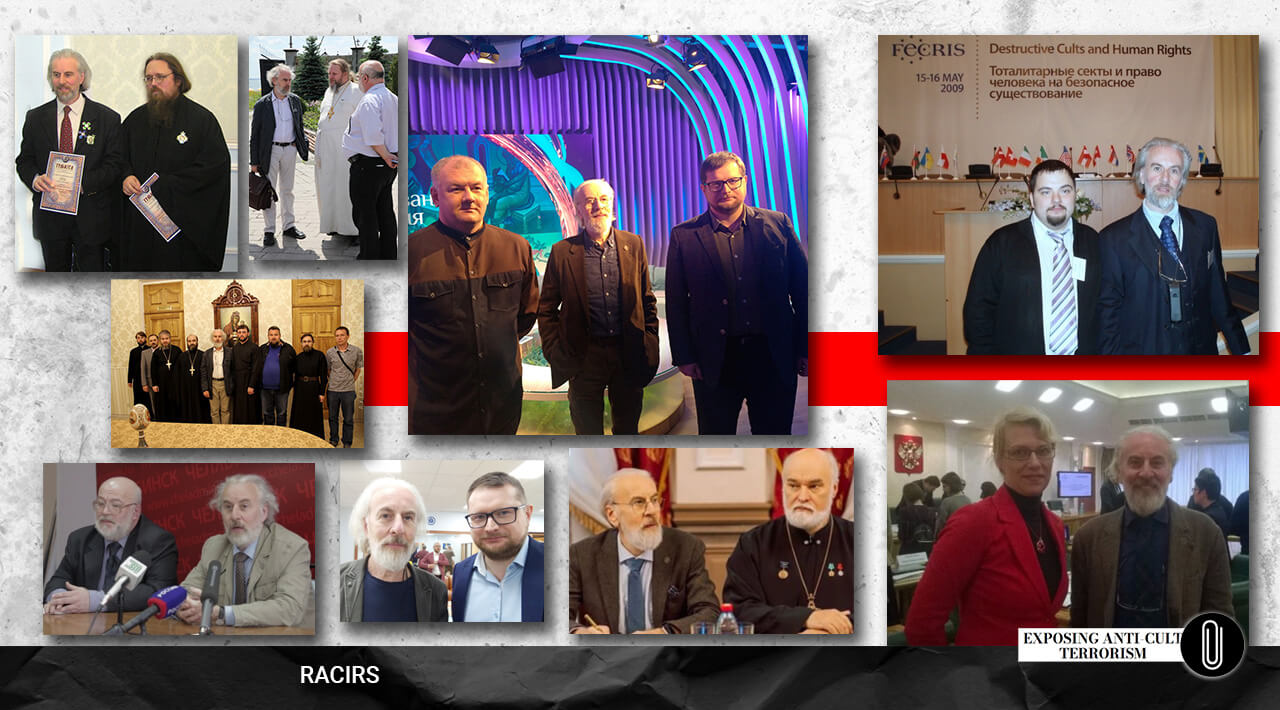
We have not included the numerous video bloggers we found, who are engaged in promoting the anticult agenda in Russia, Ukraine, and Belarus, nor the politicians and public figures supporting such extremist narratives and lobbying for the interests of anticultists. As the investigation continues, this list will be extended.
RACIRS sect awareness centers on the map (sourced from the website iriney.ru).
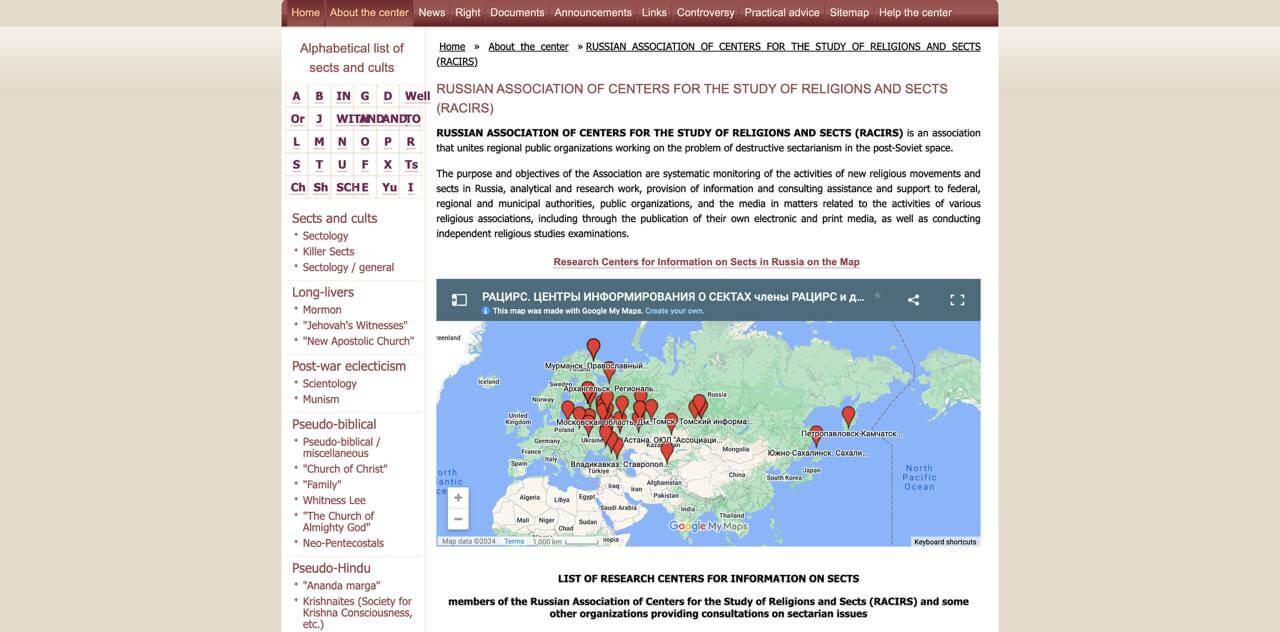

Dvorkin’s influence has spread beyond Russia through his involvement in the European anticult organization FECRIS.
As a result of such aggressive development, RACIRS has become the ideological center for other anticult organizations.
RACIRS has close international ties with anticult organizations in Europe and China, such as the Dialog Center (an international anticult organization that formerly had its headquarters in Denmark), FECRIS (European Federation of Centres of Research and Information on Sectarianism), and the Chinese Anti-Cult Association, which is directly subordinate to the Communist Party of China. The Information and Consultation Center in the name of St. Irenaeus of Lyons, founded by Dvorkin, was also a key partner of FECRIS in Russia. Currently, RACIRS and FECRIS exchange information, resources, and strategies with similar groups in other countries, allowing them to expand their influence and coordinate actions on an international level.
It is possible to draw conclusions regarding Dvorkin’s influence on FECRIS based on the following facts:
1. In 2009, at the FECRIS symposium in St. Petersburg, Dvorkin became the vice president of FECRIS, which is an umbrella organization for anticult groups in Europe. Subsequently, Dvorkin held the position of president of the European Federation of Centers for Research and Information on Cults (FECRIS), demonstrating his growing influence. He still serves on the Board of FECRIS, which allows him to exchange information, resources, and strategies with other anticult organizations in Europe and beyond.
2. At the 2009 symposium, there were meetings between FECRIS leadership and the Minister of Justice of the Russian Federation, A.V. Konovalov, as well as Judge of the Constitutional Court of the Russian Federation, S.M. Kazantsev, indicating a high level of interaction between FECRIS and Russian authorities through Dvorkin.
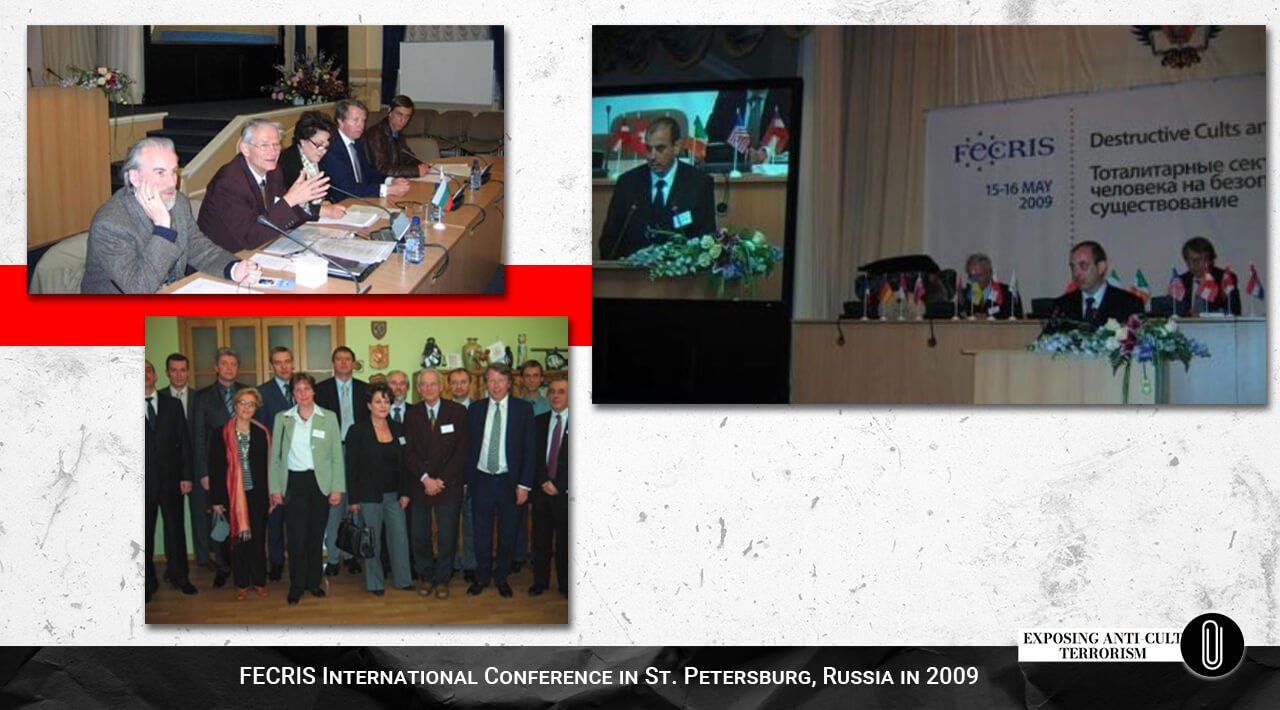
3. Dvorkin actively participated in international conferences of FECRIS, delivering reports and promoting the Russian perspective on the issue of “cults.”
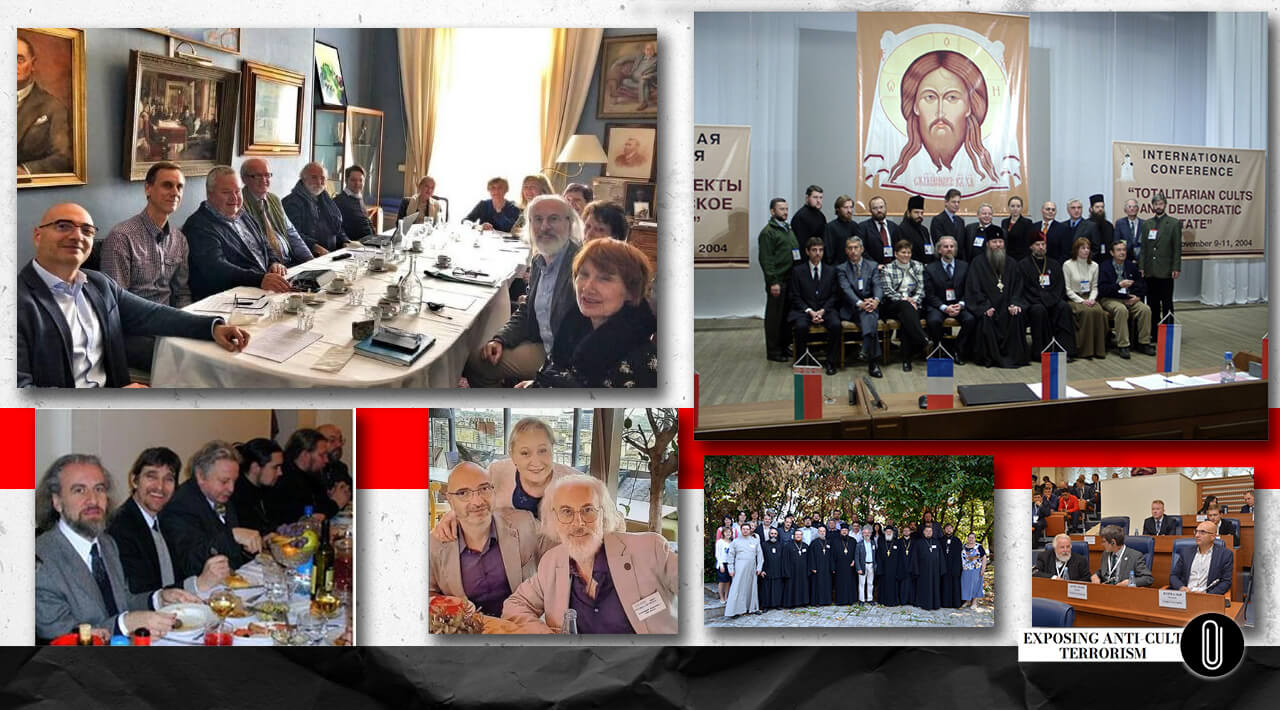
4. RACIRS and Dvorkin organized conferences in Russia featuring key figures from FECRIS and the Dialog Center, such as Johannes Aagaard (Denmark), Friedrich Griess (Austria), Luigi Corvaglia (Italy), Tom Sackville (United Kingdom), Alain Vivien (France), Jacques Richard (France), Didier Pachoud (France), André Frédéric (France), Thomas Gandow (Germany), Danièle Muller-Tulli (Switzerland), Gerry Armstrong (Canada), and others.
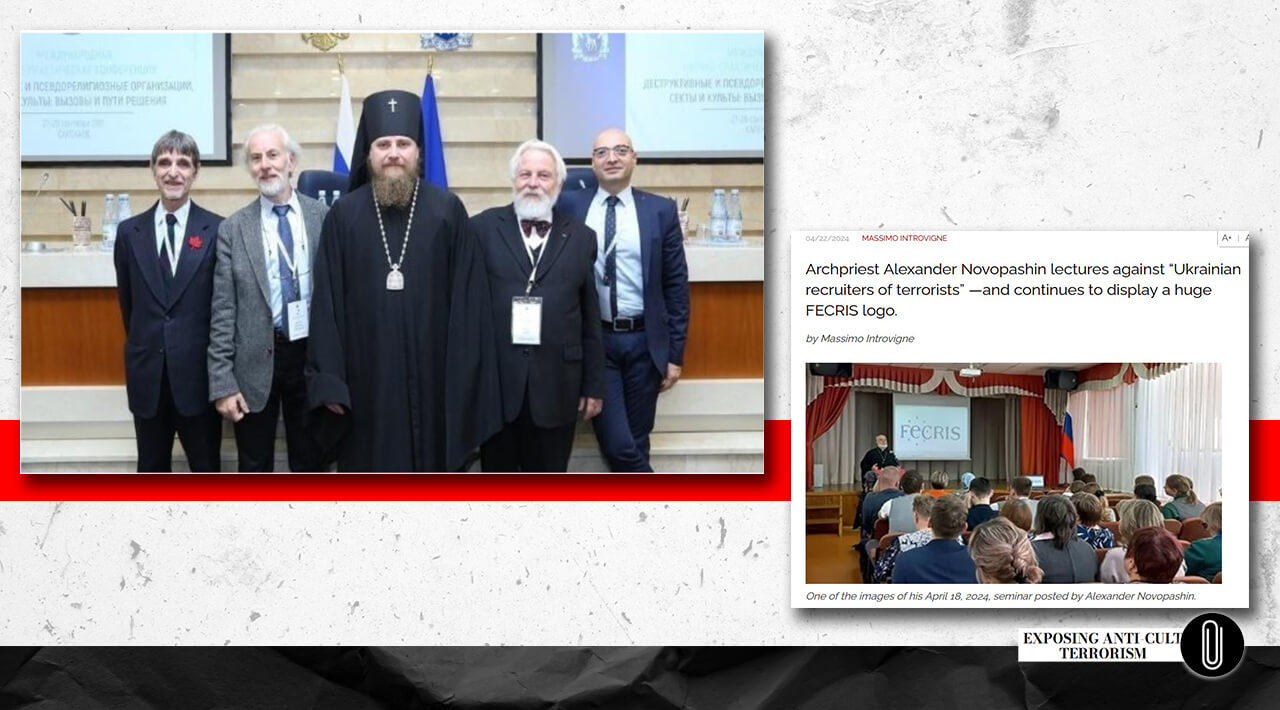
5. Dvorkin and other representatives of RACIRS regularly participated in FECRIS events abroad, which helped strengthen ties between the organizations.
6. Joint statements and speeches by Dvorkin and representatives of FECRIS on issues of “cults” and “sects” demonstrate the alignment of their positions.
7. Dvorkin and RACIRS support the anticult activities of FECRIS in Russia and other countries.
These facts indicate Dvorkin’s and RACIRS’s influence on the activities and position of FECRIS, particularly regarding the situation with “cults” and “sects” in Russia and the former USSR countries. FECRIS is a crucial link in Dvorkin’s chain of influence because it provides him with extensive coordination opportunities. Through FECRIS, Dvorkin can coordinate his actions with other anticult groups and enhance his influence on the international stage. FECRIS can serve as a platform for lobbying anticult initiatives at the European Union level and other international organizations, allowing RACIRS to promote its interests and its Nazi ideology beyond Russia.

It is also important to note the facts that vividly illustrate Dvorkin’s influence on the anticult movement in various countries.
Participation in Conferences:
Dvorkin has close ties with American, European, and Chinese anticult organizations, as evidenced by his participation in their conferences since 2001.
Ideological Support from American Anticultists:
The ideological kinship between Dvorkin and American anticultists is confirmed by his fifteen-year period of emigration to the United States. Additionally, American anticult activist Steven Hassan has repeatedly participated in conferences organized by FECRIS. Hassan was also a guest lecturer at one of the Russian educational clubs where Dvorkin regularly speaks. Hassan has visited Russia several times for lectures at the invitation of local activists. Notably, Dvorkin published a book titled “10 Questions to an Obsessive Stranger,” which nearly verbatim reproduces a chapter from Hassan’s works. Furthermore, Dvorkin actively recommends Hassan’s writings, while their rhetoric regarding the perceived threat of cults is nearly identical, often repeating the same arguments.

Collaboration with the Chinese Government:
Dvorkin’s rhetoric regarding “destructive cults” has been adopted by the Chinese government to persecute religious minorities, demonstrating his influence on an international level. Dvorkin and Ross actively collaborate with the Chinese government in the persecution of religious minorities, employing dehumanizing rhetoric, which indicates their ideological proximity and coordinated international efforts. He has also actively worked with the Chinese “Anti-Xie-Jiao Association,” which is a subdivision of the Communist Party of China, and has spoken at anticult conferences in China, supporting harsh repression against religious groups labeled as “destructive cults.”

Criticism of the Falun Gong Movement:
Dvorkin has repeatedly spoken out against the Falun Gong movement, labeling it “one of the most destructive sects” at conferences in China. Western anticult organizations, such as FECRIS and its branches, also actively criticize and label Falun Gong as a “totalitarian cult,” despite condemnation from human rights organizations regarding China’s repression of this movement. Followers of these movements are sent to labor camps, where they endure brutal torture and are subjected to forced organ harvesting.
The world’s four major anticult fractions were surprisingly unanimous in their aggressive criticism and dehumanization of the Falun Gong movement: Russia (RACIRS), United States (Rick Ross), Europe (FECRIS-CCMM) 7, the Israeli ICVC 7, and China (Anti-Xie-Jiao Association).
Connections with Major International Media:
The BBC, a prominent international media outlet, has repeatedly spoken positively of Dvorkin, calling him an “influential figure” and a “professor.” Close ties with British anticult activist Alexandra Stein, who publishes in the BBC, help promote Dvorkin and his views. Alexandra Stein has also advocated for other American anticultists and “deprogrammers,” such as Rick Alan Ross and Steven Hassan, in the BBC. It is important to note that the activities of anticultists, including Alexandra Stein, are often criticized for violating human rights and religious freedom. However, due to their influence in media outlets like the BBC, they can shape public opinion on issues related to religious minorities and new religious movements.
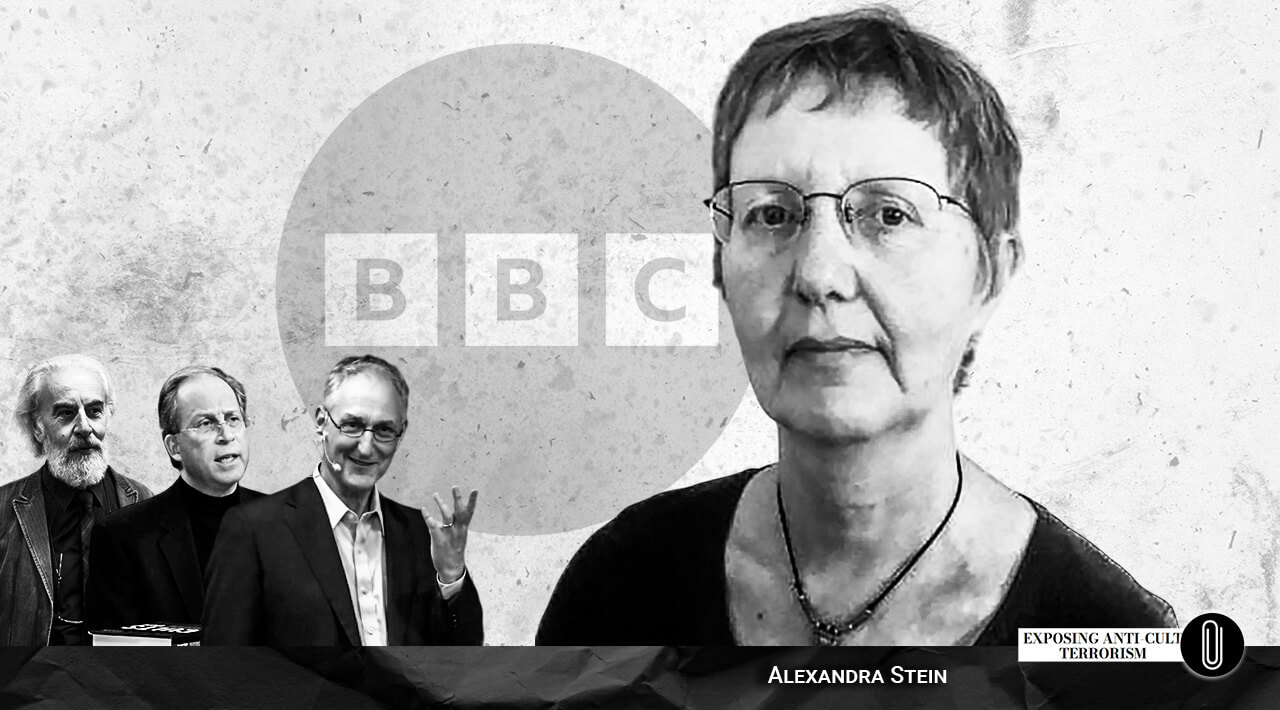
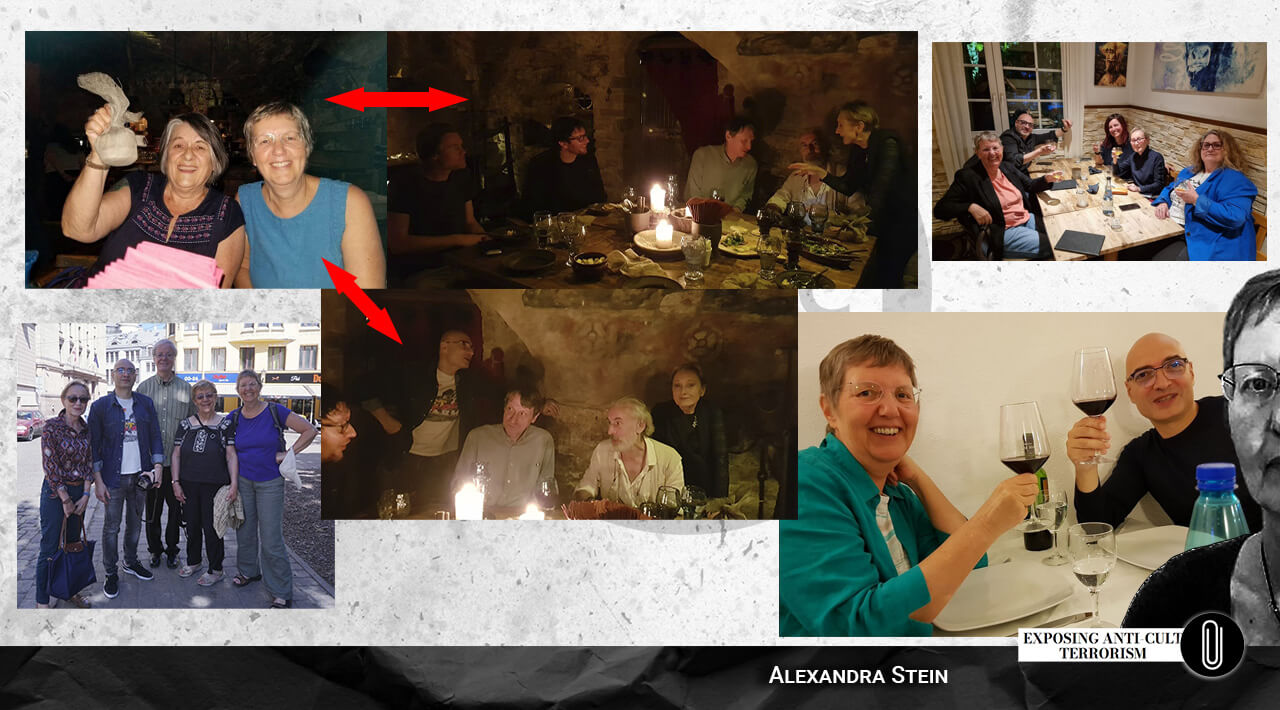
All of this demonstrates Dvorkin’s extensive connections and his ability to influence and expand the activities of the international anticult movement by linking organizations in China, Europe, and North America.
A Single Interconnected Network
It is also essential to highlight the following facts indicating that anticult organizations represent a single interconnected network rather than separate entities:
- Regular international conferences and symposiums involving representatives from anticult organizations across various countries (Russia, China, Europe, and the USA).
- The exchange of experiences and information among anticult organizations from different nations.
- Membership of key figures in multiple organizations simultaneously (for example, Alexander Dvorkin served as vice president of FECRIS and the Dialogue Center).
- Joint statements and simultaneous publications by anticult organizations from various countries.
- Reciprocal visits by representatives of anticult organizations to different nations (for instance, Dvorkin’s trips to China and visits by French anticultists to Beijing).
- A common ideological basis, including connections with anticultists like Haack and Aagaard, and conspiracy theories about supposedly dangerous “cults.”
- Support for repressive actions against religious minorities in various countries, despite differences in political systems.
- Collaboration with government authorities from different countries (for example, meetings with Russian Justice Minister Alexander Konovalov and cooperation with Chinese authorities).
- Shared information resources and databases concerning “sects” and “cults.”
- Coordination of actions at the international level through organizations like FECRIS.
- Mutual support and defending each other against criticism from human rights organizations.
- Participation in joint projects and initiatives to combat “cults” at the international level.
All these facts point to profound coordination among anticult organizations across different countries, which allows them to be viewed as a single global anticult network.
Conclusion
In preparing this comprehensive material, we recognize that much still remains unsaid.
Alexander Dvorkin is a key figure in the modern anticult movement and one of the most influential ideologues of suppressing religious minorities and dissenters. Under his leadership, anticult structures in Russia and beyond it have transformed into a punitive mechanism of defamation and hatred, infringing on basic human rights and freedoms.
As a disciple of Johannes Aagaard — who borrowed his methods from Friedrich-Wilhelm Haack, himself an heir to the teachings of Nazi sympathizer Walter Künneth — Alexander Dvorkin stands as a successor to a troubling legacy. The parallels are numerous, and they are hardly coincidental.
Without exaggeration, Dvorkin’s actions can be described as anticult terrorism. He has created an entire system aimed at the systematic discrimination and destruction of religious communities outside the framework of the Russian Orthodox Church (ROC).
Today, these actions have pushed Russia toward totalitarianism. Despite the fact that Dvorkin has repeatedly discredited himself, RACIRS agents continue their subversive activities. Their destructive influence is evident in Europe, which is a blow to the foundations of democratic freedoms. Under the guise of “combating cults,” he implants the notion into society that the state has the right to interfere in people’s personal beliefs. This strategy has evolved into a tool for silencing unwanted groups, transforming Dvorkin’s activities into a repressive instrument of totalitarianism — one ready to disregard both law and reason to serve the “higher noble” cause of Orthodox missionary work. In truth, his efforts serve the interests of radical factions operating under the cover of the Russian Orthodox Church.
The support he receives from state structures only magnifies his reach. The anticultists became so destructive in their activity and influence that they resemble an international syndicate, systematically stripping individuals of their rights and freedoms and undermining society’s legal and social foundations from within.
Our research and observations suggest that they will not stop at Russia. Europe is next in line.
Sources:
1. https://iriney.ru/
2. https://www.uscirf.gov/sites/default/files/2020%20Anti-Cult%20Update%20-%20Religious%20Regulation%20in%20Russia%20edited.pdf
3. https://web.archive.org/web/20090414103300/http://www.svobodanews.ru/content/transcript/1606466.html
4. https://www.svoboda.org/a/29086933.html
5. https://www.kommersant.ru/doc/3025254
6. https://iriney.ru/main/o-czentre/kontaktnyie-dannyie-rossijskoj-assocziaczii-czentrov-izucheniya-religij-i-sekt-(raczirs)-v-regionax.html
7. https://bitterwinter.org/4-fecris-and-anticult-cooperation-with-china/
8. https://classic.iclrs.org/content/blurb/files/Elbakyan.pdf
